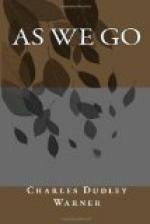purely native product, not needing any special period
of cultivation or development, and that a nation would
be in a mortifying position without one, even before
it staked out its cities or built any roads.
Captain John Smith, if he had ever settled here and
spread himself over the continent, as he was capable
of doing, might have taken the contract to furnish
one, and we may be sure that he would have left us
nothing to desire in that direction. But the
vein of romance he opened was not followed up.
Other prospectings were made. Holes, so to speak,
were dug in New England, and in the middle South,
and along the frontier, and such leads were found
that again and again the certainty arose that at last
the real American ore had been discovered. Meantime
a certain process called civilization went on, and
certain ideas of breadth entered into our conceptions,
and ideas also of the historical development of the
expression of thought in the world, and with these
a comprehension of what American really is, and the
difficulty of putting the contents of a bushel measure
into a pint cup. So, while we have been expecting
the American Literature to come out from some locality,
neat and clean, like a nugget, or, to change the figure,
to bloom any day like a century-plant, in one striking,
fragrant expression of American life, behold something
else has been preparing and maturing, larger and more
promising than our early anticipations. In history,
in biography, in science, in the essay, in the novel
and story, there are coming forth a hundred expressions
of the hundred aspects of American life; and they
are also sung by the poets in notes as varied as the
migrating birds. The birds perhaps have the best
of it thus far, but the bird is limited to a small
range of performances while he shifts his singing-boughs
through the climates of the continent, whereas the
poet, though a little inclined to mistake aspiration
for inspiration, and vagueness of longing for subtlety,
is experimenting in a most hopeful manner. And
all these writers, while perhaps not consciously American
or consciously seeking to do more than their best
in their several ways, are animated by the free spirit
of inquiry and expression that belongs to an independent
nation, and so our literature is coming to have a stamp
of its own that is unlike any other national stamp.
And it will have this stamp more authentically and
be clearer and stronger as we drop the self-consciousness
of the necessity of being American.
JUNE
Here is June again! It never was more welcome in these Northern latitudes. It seems a pity that such a month cannot be twice as long. It has been the pet of the poets, but it is not spoiled, and is just as full of enchantment as ever. The secret of this is that it is the month of both hope and fruition. It is the girl of eighteen, standing with all her charms on the eve of womanhood, in the dress and temperament of spring. And the beauty




